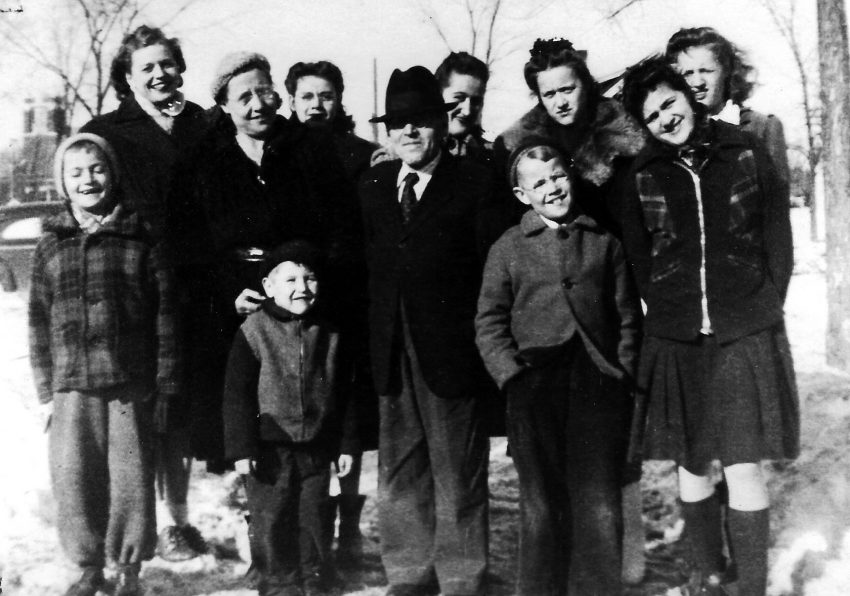Family History and Genealogy are two terms often debated between people researching their family line. So from Webster’s Dictionary
Family History (noun) – 1: past occurrences (of a medial or mental health condition) in family members or past incidences (of a type of behavior) by family members. 2: a record of one’s ancestors
Genealogy (noun) – 1: an account of descent of a person, or group from an ancestor or from older forms. 2: regular descent of a person, family or group of organizations from a progenitor or older form pedigree. 3: the study of family ancestral lines. 4: an account of the origin and historical development of something
We see many reasons to love English in these definitions as context is everything in understanding the meaning. Typical I will simplify definitions in my discussion, focusing on how these pertain to genealogy research based on how I see the meaning behind my genealogical work.
For me, Genealogy is research of your ancestors using only vital records, birth, marriage and death certificates. People doing genealogy in this manner aren’t concerned with county boundary changes opting to reference the vital records to tell the story of their ancestors lives. They often feel this is all the information needed to determine who your ancestors were.
Often those who rely on vital records today will also rely on DNA genealogy. DNA genealogy is a complex subject able to reveal locations your ancestors come from.
Between DNA and vital records they consider themselves as proving their ancestral line.
Family History is researching in depth the history of your ancestors lives. You have decided to build their story, to take on learning history and the impact history had on them and the areas they lived. You actively spend hours researching old newspapers, written histories, court records, land records, etc. to validate your ancestors life.
For me treasures include old letters for me to read, gaining a glimpse of my ancestors life and gaining validation and accurate sources to document my ancestral genealogy.
When I look at researchers from both side I am not one to judge who is right or wrong. I myself am a family historian. My research goes very deep and at times created other projects I have been a part of. AniMap is just one of many.
Researching William Bentley and Anna Lynn Bentley created a desire for me to write a history on Deerbrook, Langlade County, Wisconsin. Currently the history is still being complied with minimal writing, because of the vast conflict I found while researching this project. So conflicting there is a plat map for the Village of Neva right over the top of where Deerbrook is located, having the exact street layout as Deerbrook. Consequently this is not something that could have happened, yet we have a legal document showing it really happened.
Even though genealogy uses vital records this can leave them unable to answer one simple question; “Are you sure the person on your birth certificate is the person in your family?”. Ask this question you will get a rather strange look with the answer “of course it is”. Therefore I elaborate a bit in this case because in my family there are many situations this would be a very logical question to be asking yourself.
Although my Great Great Grandfather, Joseph Allard moved from Canada to Bay Settlement, Brown County, Wisconsin, additionally having a lot of information on him and his family, research would show there is another Joseph Allard who moved from Canada to Bay Settlement, Brown County, Wisconsin around the same time as my ancestor. Besides having the same name we find their wives also had the same name, Adelaide. Consequently what other documentation do you have proving the birth record you found of Joseph Allard in Canada is the very Joseph Allard who is your ancestor? Vital records are unable to clearly answer this question without knowing the names of their parents.
Considering names were popular by both nationality and time period you may find similarities in their parents names as I found with these two people. It has taken years to sort this out, albeit I don’t feel I have completely solved this part of my genealogy. Currently my research relies too much on others research whereas I wasn’t given documents to prove either way.
People spend countless hours researching genealogy, compiling information, documenting what they’ve found. Some choose to submit final work for approval as a professionally accepted genealogy of family. Therefore I am not going to judge what method you use is right or wrong, that decision is in your hands.
I can conclude for those doing genealogy to know with any level of certainty your vital records are the one belonging to your ancestor, you will have to dig into minimal history or risk your research being like others researching Joseph Allard. Landing with a mix between siblings of these two families, whereas someone will point to an error in your research and you may be like so many others I’ve encountered, arguing with me on how right your research is against my historical facts that prove your research incorrect. Typical these people don’t admit we point out mistakes in research to aid in guiding you in your research down the right road. Many of us have spent more hours than we care to remember chasing the person we eventually found wasn’t the one we needed to be researching.
Whether you do genealogy or family history, together we need to get more involved in this work. Our ancestors lives are important, they had meaning, intent and dreams they shared and left to us. The reason we search is because too many don’t listen when the stories are told. In the end I believe we all lose when these stories aren’t told.

